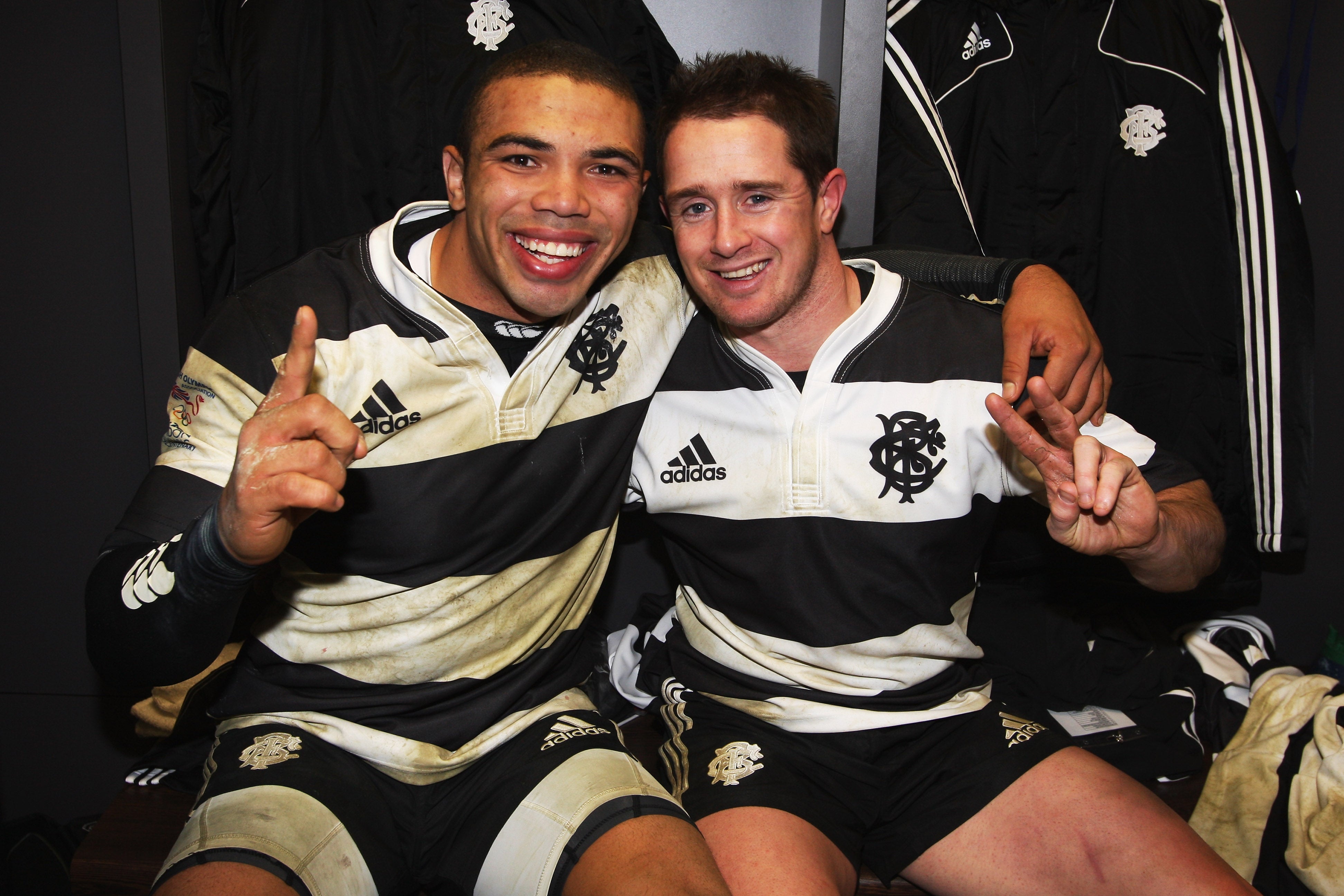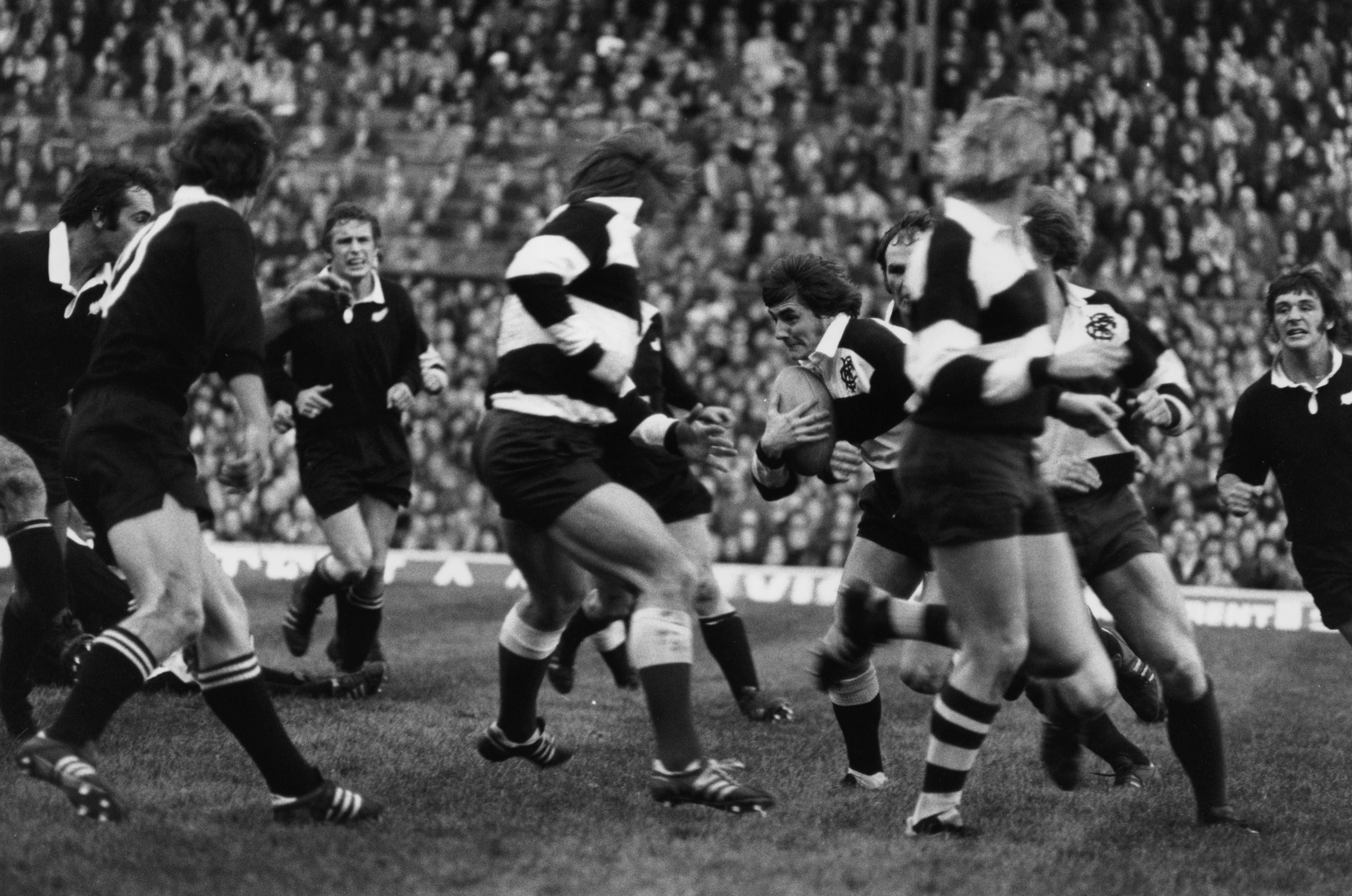The Barbarians are rugby’s biggest anachronism – don’t ever take them away
As the modern game becomes more professional and predictable, rugby’s idealistic, nostalgia-fuelled answer to the Harlem Globetrotters must be protected at all costs, writes Luke Baker


In professional sport, where results and the bottom line is the undisputed king, there is rarely room for sentimentality or history. The record books are littered with legendary athletes cast aside once they’ve outlived their usefulness and once-great institutions being allowed to rot into a shadow of their former selves or ceasing to exist entirely.
As a concept first conceived more than 130 years ago in Leuchters Restaurant, Bradford and whose most defining moment occurred exactly half a century ago, Barbarian FC are perpetually on the chopping block.
They are rugby’s biggest anachronism, a throwback to an era when the sport was unapologetically amateur and thus make almost no sense in the modern day with its hyper-professionalism, packed fixture calendar and concerns around player welfare. For that reason, they must be protected at all costs.
That the Barbarians are still going strong 133 years after William Percy Carpmael first came up with the idea to take a touring team comprised of all-comers on the road and subsequently beat Hartlepool Rovers 9-4 on 27 December 1890 in their first-ever fixture is remarkable. But this Saturday, the Baas-Baas, based on the same 19th-century ethos that has sustained them all these years, will run out at Principality Stadium in Cardiff to face Wales as rugby’s most enduring – and perhaps most iconic – team.
If you’re unaware, the Barbarians are an invitational, nomadic side who play in a famed black-and-white hooped shirt with each player wearing socks from their own club strip. They’re an invitation-only team of all-stars – rugby’s answer to the Harlem Globetrotters, although really the Globetrotters are basketball’s answer to the Barbarians, given their genesis came 36 years later – who play an attacking, free-flowing, exciting brand of rugby regardless of the circumstances. Entertainment and having fun are far, far more important than winning.
They have inspired numerous regional offshoots of the brand down the years, including the French Barbarians, Australian Barbarians, New Zealand Barbarians and South African Barbarians, while a women’s Barbarians team was finally added to the mix in 2017.

Pretty much every giant of the sport, from all over the world, has pulled on the Baas-Baas jersey at some stage and no great player’s CV is complete without an appearance. From Sir Gareth Edwards and Phil Bennett through David Campese and Jonah Lomu to Bryan Habana and Richie McCaw – the sport’s lineage can be traced through the history of those black-and-white hoops.
The club’s motto was established early on by Reverend Walter Julius Carey, former Bishop of Bloemfontein and an ex-Barbarian: “Rugby Football is a game for gentlemen in all classes, but for no bad sportsman in any class”.
A pompous and grandiose ethos? Sure. But given it was created in the 19th century for a team almost exclusively comprised of Oxbridge graduates, that’s hardly a surprise. Yet, the sentiment has always remained – the Barbarians strive to play rugby the ‘right’ way, are always sporting and exhibit their trademark style with flair, courage, spirit and passion on the field.
This was never more true than in their finest hour, when they scored rugby’s greatest try, exactly 50 years ago in January 1973. You know the one. It’s that try.
The end-to-end score that starts with Bennett side-stepping three All Blacks in his own 22 to set off a scintillating move that goes through seven sets of hands and ends with Edwards launching himself into the air to score in the corner. Cliff Morgan’s BBC commentary is almost as legendary as the try itself.
Kirkpatrick to Williams. This is great stuff! Phil Bennett covering chased by Alistair Scown. Brilliant, oh, that’s brilliant! John Williams, Bryan Williams. Pullin. John Dawes, great dummy. To David, Tom David, the halfway line! Brilliant by Quinnell! This is Gareth Edwards! A dramatic start! What a score!!... Oh that fellow Edwards....If the greatest writer of the written word would’ve written that story no one would have believed it. That really was something.
The Baa-Baas would beat New Zealand 23-11 in front of 51,000 people at Cardiff Arms Park that day and it resonated around the sporting world, even as far as Australia where a teenage Eddie Jones was mesmerised.
“I can still remember our PE teacher at high school showing us that try, saying boys this is the way you play rugby,” recalled Jones this week, as he prepares to coach the Baa-Baas against Wales. “It’s stood the test of time and it’s an intoxicating game.”
In that proudly amateur era, the Barbarians made sense as a thrilling curiosity facing the best teams in the world to help fill the calendar. But what about in 2023? Hasn’t their time passed and the idea of an invitational side taking on the world’s best (even if they’re often winning as they did when downing South Africa 22-5 just a couple of months after the Springboks had won the 2007 World Cup) is now quaintly outdated?

Certainly there has been consternation over this weekend’s fixture, which clashes with the Welsh derby between Scarlets and Cardiff, meaning a number of players are unavailable for their clubs as they represent Wales.
“It’s obviously unhelpful,” fumed Scarlets coach Dwayne Peel. "I think post-World Cup you always look forward to having your squad together. From a spectacle as well, when you play derby games, you want your best squads available and that isn’t the case this week. So look, it’s frustrating. It was frustrating when this fixture was announced. Obviously, for the Union, there’s a commercial value, but we lose out on a commercial value as well. It is frustrating, that’s the bottom line.”
Welsh Rugby Union (WRU) CEO Nigel Walker admitted the situation was a mess and stressed that it wouldn’t happen again. But, in this instance, the match was seen as a vital revenue raiser by the WRU following the loss of the usual November Tests and that, combined with the desire to celebrate the 50th anniversary of Edwards’ famous try, came out on top.
Baa-Baas fixtures can throw a spanner into the already complex works of the calendar in the modern game but in, an ultra-professional world, the invitational side provide some much-needed light to combat the shade.
“It still has an important place in professional rugby,” insisted England prop Joe Marler. “It’s even more important now to have it because everything is so intense, so pressurised and serious. You need to have an opportunity to enjoy rugby for the reasons you started playing for. You just want to pick up the ball and play and have fun.”

Back in 2010, Australian great Matt Giteau echoed this. “The Barbarians are very important to rugby,” he said. “It is a week I really look forward to, something that gets me through the November tour. Playing for the Barbarians reminds you why you play rugby. When you go out there you play on instinct back yourself, which I believe is the greatest way to play the game.”
Logic and reason won’t really provide the arguments to keep the Baa-Baas alive in the 21st century. They’re a team that have always unashamedly tapped into nostalgia, idealism and that childish enthusiasm felt when first falling in love with rugby.
Maybe the world needs a little bit more of that. Rugby’s greatest, in every sense of the word, anachronism cannot be allowed to fade away.
Join our commenting forum
Join thought-provoking conversations, follow other Independent readers and see their replies
Comments
Bookmark popover
Removed from bookmarks